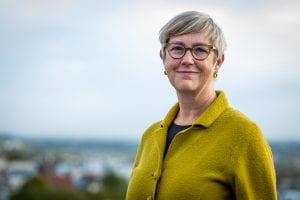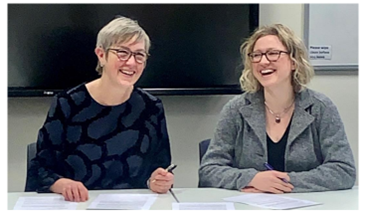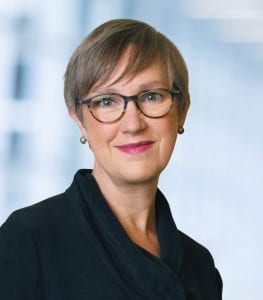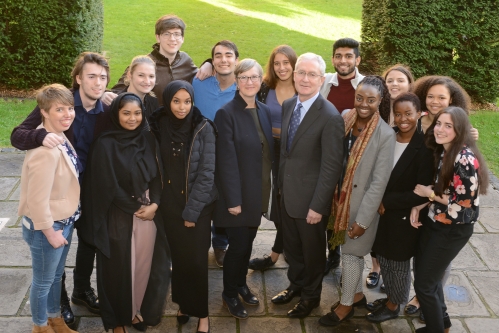 To mark International Women’s Day 2024, our Deputy Vice-Chancellor and Provost, Professor Judith Squires, reflects on progress made towards gender equality at Bristol, our efforts to make a positive impact on the lives and careers of women both locally and nationally, and the importance of year-round commitment to these issues.
To mark International Women’s Day 2024, our Deputy Vice-Chancellor and Provost, Professor Judith Squires, reflects on progress made towards gender equality at Bristol, our efforts to make a positive impact on the lives and careers of women both locally and nationally, and the importance of year-round commitment to these issues.
International Women’s Day (IWD) is an occasion to recognise the incredible work of women around the world – and for leaders of organisations everywhere to consider the investments we are making in gender equality and career progression for our female colleagues.
I want to take this opportunity to reflect on our progress here at Bristol in relation to this year’s United Nations theme, “Invest in women: Accelerate progress”, and the IWD campaign, “Inspire Inclusion”.
As a global civic university, we believe that our aspirations can – to quote our 2030 Strategy – “be best shaped and delivered collectively by a diverse and empowered university community”. A key component of that approach is improving our processes and structures to provide a level field for every member of our community.
Over the years, the University has made good progress with the gender pay gap, and initiatives have been put in place to encourage female leaders and remove gender inequality in the higher education sector. We have been working collectively with the City of Bristol and civic partners to encourage enterprising women, tackle sexual violence and harassment and to create a more equitable, diverse and inclusive city.
There is still work to be done, but I wanted to share some of the ways in which the University has been investing in women to forge a gender equal and inclusive future.
Advance HE Athena Swan Charter
The University of Bristol was one of the founding signatories of the Advance HE Athena Swan Charter, which serves to remove gender inequality and underrepresentation in the higher education sector. We are delighted that the University’s commitment to equality has been recognised in the 20 school-level awards and, in February 2023, we were also awarded a highly commended institutional Silver Swan Award.
Moving towards gender parity
It’s encouraging to see the steady progress in our reduction of the gender pay gap at Bristol; our Vice-Chancellor, Professor Evelyn Welch, gives further detail on this in her IWD blog post today, but both the mean and median pay gaps have reduced each year since we began reporting in 2017.
Although we are pleased to see this progress, we know we have more work to do. Achieving gender parity remains a top priority. We now have 34% female professors, exceeding our initial target of 33% and the sector average of 28.5%. We are now aiming for 50% of professors to be female by 2030, as part of our commitment to eliminate the gender pay gap within the same time frame. Some of the key actions we have identified include engaging each of our faculties in action at local levels to improve female professorial representation across their disciplines.
We also aim to better understand and address the implications of part-time working for gender pay, promoting the potential for job sharing for colleagues in leadership roles and developing a targeted programme to better support parental leave returners (prioritising part-time returners) to work on challenges and enablers for their future career progression; and undertaking intersectionality pay gap reporting annually, since group identities such as race and gender cannot be fully understood in isolation from each other.
Career development
Another important area of investment to support women in the workplace is a breadth of development opportunities. It’s great to see the Female Leadership Initiative going from strength to strength: we had a record number of applications this year and we currently have 60 participants across two cohorts.
I am really pleased that the Bristol Women’s Mentoring Network goes from strength to strength. We are in the process of matching the current applicants and have received 129 mentee applications and 96 mentor applications. This is a huge increase from last year’s cohort which saw 44 pairs being matched. The new mentees are keen to use their mentoring relationship to develop their career progression.
We continue to support applicants to the Elevate programme, aimed at women from Academic staff (up to grade L) and Professional Services staff (grades E-K) from Black, Asian or Minority ethnic backgrounds who identify as female. The programme creates a unique opportunity to meet, share, support and learn together.
Alongside this we have 10 academic staff and PGRs from across disciplines on the WHEN (Women’s Higher Education Network) 100 BWPN this year. This particular programme seeks to enable systemic change in institutions to effectively address the lack of Black women professors, targeting all areas of the academic research pipeline.
Empowering Parents in HE, led by Dr Jenny Crane and Dr Erika Hanna, is looking at enhancing research culture by embedding learnings through a co-produced artwork which explores and celebrates parenting alongside working at the University. The project leads aim to work with schools and senior management across the University to action recommendations for supporting parents.
And if you’re interested in hearing from a range of inspirational women across the University, Nadia Soliman is hosting a Leadership Ethos event on 30 April. This event draws on Nadia’s experiences, both within and outside academia, with a focus on how we can empower everyone to lead and exhibit leadership behaviours. The event will launch the Leadership Ethos Framework, which will be accessible to the sector via a web hub that includes tools and resources.
All of this progress and investment is the result of sterling work by a range of teams and networks, including the Women’s Staff Network, to provide spaces, platforms, visibility, mentoring and advocacy. Bristol-based programmes such as the Female Leadership Initiative and the Bristol Women’s Mentoring Scheme have also energised our activities supporting female progression.
Continuing the conversation
We’re marking IWD 2024 throughout this month: next week, I’ll be introducing ‘Progress and Equity in Maternity Care’, a discussion between Emeritus Professor Jean Golding and Dr Charlea Williams from Bristol Medical School; and I’ll be continuing the IWD conversation on this blog with another post, going into more detail about our local partnership to tackle sexual violence and harassment on campus, our support of global women’s empowerment through our global civic work, and other initiatives and collaborations.
As Evelyn remarks in her IWD post: “Every day, not just one day of the year, belongs to women around the world”. I wholeheartedly concur, and I look forward to further progress on gender equality at Bristol, with the help, commitment and invaluable input of so many of our colleagues.

 To mark International Women’s Day 2024, our Deputy Vice-Chancellor and Provost, Professor Judith Squires, reflects on progress made towards gender equality at Bristol, our efforts to make a positive impact on the lives and careers of women both locally and nationally, and the importance of year-round commitment to these issues.
To mark International Women’s Day 2024, our Deputy Vice-Chancellor and Provost, Professor Judith Squires, reflects on progress made towards gender equality at Bristol, our efforts to make a positive impact on the lives and careers of women both locally and nationally, and the importance of year-round commitment to these issues.
 After two years of online celebrations, I was exceptionally proud to join colleagues in person last month for a Provost Celebration of Academic Achievement. We were celebrating the major £10m funding success of the Economic and Social Research Council (ESRC) Centre for Sociodigital Futures, led by the University of Bristol.
After two years of online celebrations, I was exceptionally proud to join colleagues in person last month for a Provost Celebration of Academic Achievement. We were celebrating the major £10m funding success of the Economic and Social Research Council (ESRC) Centre for Sociodigital Futures, led by the University of Bristol.


